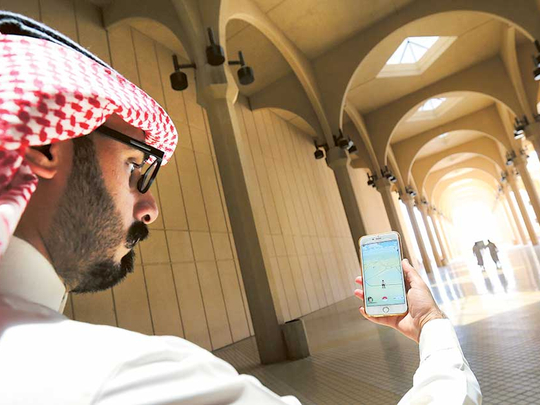
Riyadh: Pokemon Go fever has spiked as high in Saudi Arabia as anywhere. But in the kingdom, the addictive game isn’t just a game — it’s a social mirror.
For a start, half the population has to figure out how to play a roaming outdoor game in a country that restricts their movements. Women are strongly discouraged from driving; many cannot go out without a male chaperone; and most public spaces are segregated. Their latest predicament has ignited a discussion on Twitter.
“Poor girls, they cannot play,” @Mr_SeLyk tweeted, mocking an imaginary female player. “She will reach the final level by walking around her living room five times.”
“The game is not suitable for us girls,” @Onlysoomai agreed. “Otherwise I would have downloaded it. It is a great game.”
Other women are having none of that, flocking to PokStops with their drivers. “People have gone crazy,” tweeted @Lama_algosaibi. “Even at busy intersections there is Pokemon, and girls are with their drivers searching for Pokemons.”
One woman joked that the craze might open up a business opportunity. “Delivery drivers could have a new service driving girls to catch Pokemons since they can’t drive cars,” @Ashwag_Ahmed tweeted.
Ahlam Sulami, a 33-year-old health educator at a public hospital here, is one of those female Pokemon players, and she doesn’t see the challenges as a joke. To her, the game is all about having fun — especially for women who have few chances to take part in public activities.
“I go with the driver. It’s easy,” she said, noting that the game allows her to “build strong social bonds with other players” and learn more about the city. “It is like a tourist guide to attractions and landmarks I never knew existed.”
But Sulami acknowledged that she doesn’t get out of the car to pursue Pokemons and that “takes some of the fun away”.
“I wish we [women] had more open space to meet other players,” she said.
Abdul Aziz Al Gunaim, a 17-year-old high school student, spoke sympathetically of the challenges facing his sister and other female relatives who want to play. They all discuss where to search next, he said, but when they go out with their family driver on a Pokemon quest, “most of the time my sister will film me catching one”.
Women aren’t the only ones being discouraged from playing, however. Saudi players, in general, have been bombarded with videos and social-media messages denouncing the game as “dangerous” and potentially subversive.
The Saudi Communication and Information Technology Commission warned that such applications may “invade users’ privacy and misuse the information,” as well as “expose players’ geographical locations to outsiders.”
Shaikh Abdullah Al Manie, a member of Saudi Arabia’s highest religious body, the Council of Senior Scholars, told the Saudi newspaper Okaz last week that it is “not permissible” for Saudis to play Pokemon Go.
The game “is harmful to national security and aims to uncover secret locations, which is treason,” he said.
Technology expert Saeed Al Douwiquri has called for a ban on the game, saying it is “designed for spying and aims to collect information for foreign countries”.
Luckily for fans, not all Saudi authorities appear to fear the game. Earlier this month, the Education Ministry’s undersecretary for curriculum and educational programmes, Mohammad Aharthi, announced that the ministry plans “to use the game in an educational contest for students” this summer. The aim will be to teach students about Saudi landmarks, he said
The Council of Senior Scholars denied on its Twitter account last week that it had issued a fatwa prohibiting Pokemon Go. It also denied reviving the 15-year-old fatwa banning the original Pokemon card game.
Sulami wasn’t surprised by the denials. “Saudis are more educated now than before,” she said. “I don’t think any fatwa or warning like that would be adopted or stop people from exploring new things.”












